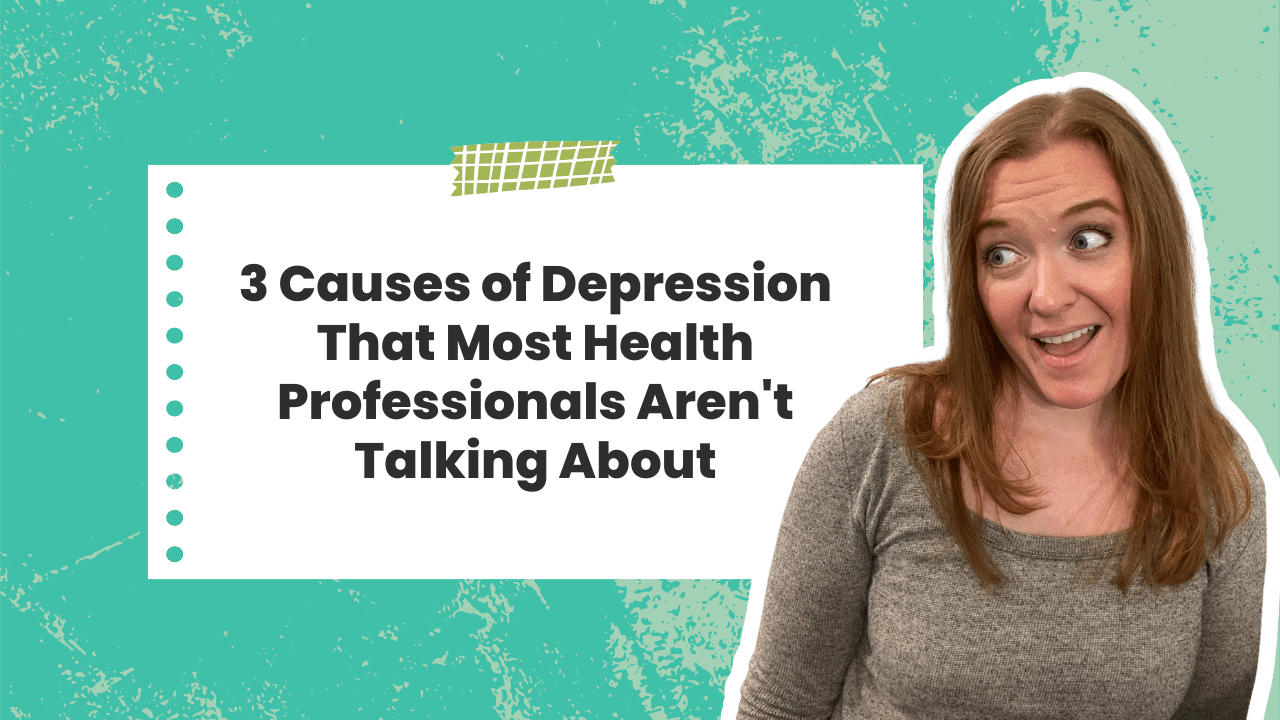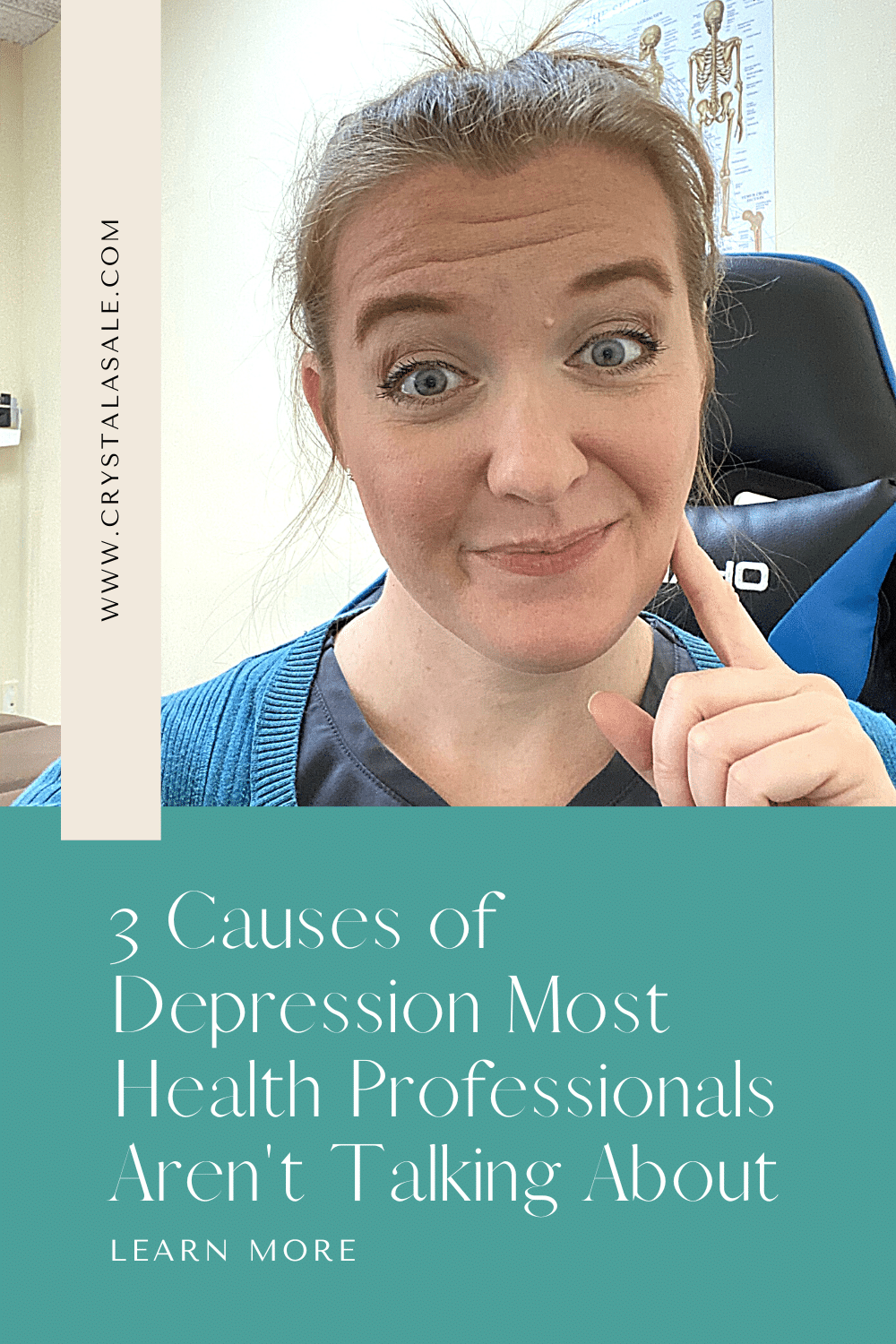
3 Causes of Depression That Most Health Professionals Aren't Talking About
Most people think of depression as a psychological problem. But did you know there are at least 3 physiological causes of depression linked to body function and your diet?
Depression is something I have personally faced and, sometimes, no matter how much work I put into my mindset it would still regularly surface. Creating daily practices to improve your mindset and self-belief is absolutely critical, but there are also underlying issues that could be occurring. Taking a wholistic look at the entire picture is just as important.
In this episode, we'll discuss those 3 physiological causes of depression and what you can do to beat them.
Let's jump in!
3 Causes of Depression That Most Health Professionals Aren't Talking About - Episode 5
Since we're talking all about physiological causes of depression, I thought it would be helpful for me to include my absolute favorite recommendations in alleviating these causes.
I use these recommendations every single day and will never go a day without them. I no longer experience those depressive ups and downs and I have more energy than I can remember having in a very long time!
I know how much these recommendations have changed my life and I just know that you are going to love them as much as I do! So go ahead, check them out by clicking the orange button above.
Now let's get to the good stuff!
3 Causes of Depression That Most Health Professionals Aren't Talking About
Most antidepressant medications work by balancing and replenishing neurotransmitters such as serotonin and dopamine. But what is the actual cause of these imbalances in the first place?
Studies have shown that there are 3 potential problems in the body that are linked to depression.
Nutrient Deficiencies
In doing my research, I just knew there had to be a link with some type of nutrient deficiency and my hunch was right on point.
Depression has been linked to folic acid and vitamin B12 deficiencies. In fact, one study showed that low folate levels are linked to poor response to antidepressant medications.
Studies have also found increased levels of homocysteine in patients with depression. High levels of homocysteine are a common indicator of low folate and vitamin B12 levels and is also correlated with low serotonin levels.
So what exactly does all of that mean?
Folic acid and vitamin B12 are used to break down excess levels of homocysteine, which is an amino acid used to make proteins in the body. When there is not enough folic acid and B12 available, homocysteine goes uncontrolled and builds up in the body and can lead to even more detrimental health problems related to autoimmunity and chronic inflammation.
Supplementation of folic acid and B12 can help in the improvement of depressive symptoms; however, you should check with your doctor to determine if this is the right fit for you.

Oxidative Stress
Oxidative stress is the number one cause of aging and aging-related diseases. It is the imbalance in the production of reactive oxygen species, also known as free radicals, and our natural antioxidant defenses.
Free radicals are highly reactive molecules that trigger a chemical reaction, or oxidation, of other molecules in the body. Yes, you heard me, oxidation. This is a process similar to the browning of an apple or the rusting of a nail, but inside your body.
This is actually a helpful and normal process in the body. Unfortunately, as we age, the body's natural defense system that keeps these free radicals in check starts to diminish.
Studies show a clear link between oxidative stress and depression and is even linked to neurodegenerative diseases. This link is likely due to the brain's higher oxygen consumption and weaker free radical defenses.
So what can you do in the fight against oxidative stress?
Antioxidants are utilized in the body to neutralize free radicals. As the body's ability to produce antioxidants diminishes with age, consumption of them is the most common method used against the overproduction of free radicals.
Foods like blueberries, prunes, red beans, pecans, and cranberries are all good sources of antioxidants.
Leaky Gut
The gut is often referred to as the second brain and so it comes as no surprise that gut issues are a common cause of depression.
>> Do you remember how we talked about serotonin and its link to depression?
>> Did you know that 90% of the body's serotonin production occurs in the gut?
Considering a survey in 2015 found that 74% of people are living with digestive issues, this is a huge deal!
Leaky gut occurs when the lining of the gut loses its integrity and becomes more porous, allowing food particles, bacteria, and toxins to enter the bloodstream. All of this also leads to a change in our good gut bacteria and inflammation.
These gut issues mess with proper production of serotonin causing a big impact on mood and sleep.
So, what can you do to heal a leaky gut?
Collagen has been shown to improve the integrity of the intestinal tract, reducing the permeability of the gut lining. You should also take a quality probiotic to help restore balance to your natural gut flora.
It is important to note that there are many causes of depression. This should not be looked at as a comprehensive list and it should not substitute consulting with your doctor about your specific needs.
In Closing
We often associate depression as being entirely a brain issue. We work on mindset and positive thinking. Depression medications even focus on balancing the levels of certain neurotransmitters in the brain.
But what is actually the cause of depression?
We discussed the role of these 3 physiological links to depression:
As a chiropractor, I believe whole-heartedly in naturally healing the body so that it can function at an optimal level and do what it was created to do. The body was created of such intelligent design that it is capable of healing itself more perfectly than anything else outside of it.
If you agree with me on that, than I know you are going to want to check out my absolute favorite recommendations for helping in the fight against oxidative stress and leaky gut. My recommendations are entirely natural, sustainably-sourced, and boost the body's own ability to heal itself.
Go ahead and grab my favorite recommendations by clicking the orange button above.